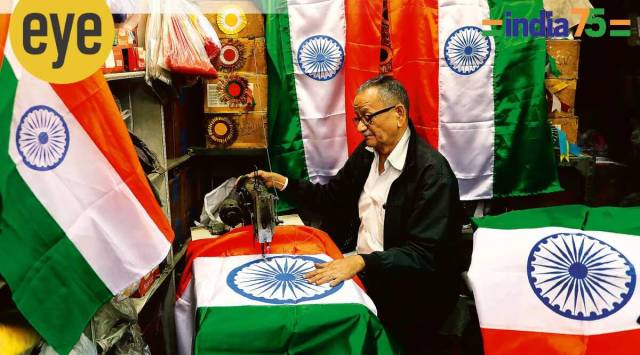Latest Comment
Post Comment
Read Comments
 Colours of the land: In Kolkata, an elderly man stitching national flags in his shop. (Partha Paul)
Colours of the land: In Kolkata, an elderly man stitching national flags in his shop. (Partha Paul)Independent India marks the start of its 75th year of freedom divided between advocates of “Hindu nationalism” and those who cling to an increasingly derided secular pluralism. In the new Hindutva dispensation, dissent against the transformation of the state is denounced not merely as negative but as anti-national and unpatriotic. Who, then, is a patriot, and who a nationalist?
Salt that Seasons: Postcard from Dandi
 First hand: The National Salt Satyagraha Memorial at Dandi, Gujarat, captures the experience of the march from 1930 (Photo: Nirmal Harindran)
First hand: The National Salt Satyagraha Memorial at Dandi, Gujarat, captures the experience of the march from 1930 (Photo: Nirmal Harindran)
When Mahatma Gandhi scooped a fistful of salt, he ignited civil disobedience movements across the country. His Dandi March in 1930 covered 390 km in about 25 days, had over 80 participants and 21 halts from Sabarmati Ashram, Ahmedabad, to this village in Navsari, Gujarat, along the Arabian Sea coast. Dhirubhai Patel had only been born that year.
Headlong into the Future
 Shoulder to shoulder Gulammohammed Sheikh’s watercolour on arches paper, Undying Erasures (2021)
Shoulder to shoulder Gulammohammed Sheikh’s watercolour on arches paper, Undying Erasures (2021)Almost simultaneously at two ends of the country, two events defined the quest for the new nation’s cultural identity. One is the formation of the Progressive Artists’ Group in the metropolitan city of Bombay in 1947, which heralded the arrival of the “modern” on the horizon of contemporary art in India.
The collective brought together a motley group of artists (a Catholic from Goa, a Bohra from Indore, two Maharashtrian Hindus, a Dalit and a Kashmiri) on a platform that effaced regional or religious identities with an unfettered spirit of art. Each with an individual vision, these artists from diverse backgrounds were charged by their staunch resistance to colonial modes and narrow parochialism. The group emulated the international modern as a model to surge ahead with a passion for initiating a new era of vital and vigorous art.
All the Nation’s Men
 Even as there are no dearth of newsmakers, not a day goes by without an anachronistic Indian political cartoon.
Even as there are no dearth of newsmakers, not a day goes by without an anachronistic Indian political cartoon.
If you want our democracy, which steps into its 75th year, to look a bit ancient, you could say the British left us in the last millennium. Not many would be old and alert enough to remember the “Tryst with Destiny” speech by India’s first prime minister Jawaharlal Nehru. But, the millennial moment is easier to recall; it was a mere 20 years ago. The prime minister then was the veteran parliamentarian from Nehru’s days, Atal Bihari Vajpayee.
A Tale for the Time Being
 Two veterans pen down poems as India celebrates 75th Independence Day. (Source: Getty images/Thinkstock)
Two veterans pen down poems as India celebrates 75th Independence Day. (Source: Getty images/Thinkstock)
Freedom Song
Hoshang Merchant
Politics without poetry is dry
Poetry without politics is effete
A Korean pianist plays
Chopin, Revolutionary Etude
On video
The video shows
Play It As It Was
 The popular cinemas of India matched the new-old country, reflecting the staggering cornucopia of colour and noise, wary and scornful of Western understatement, uneasy with realism.
The popular cinemas of India matched the new-old country, reflecting the staggering cornucopia of colour and noise, wary and scornful of Western understatement, uneasy with realism.
The idea of India has been constructed through push and pull, in which old and new, ancient and modern, traditional and contemporary are constantly rubbing up against each other, making room – adjusting – in an endless, eternal dance.
We sing, with equal passion and gusto, “saare jahan se achcha Hindustan hamara” and “jinhe naaz hai Hind par who kahaan hain”. Optimism, deep nihilism. We thrive on contradiction. Long live the argumentative Indian!


